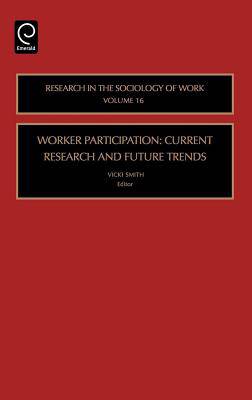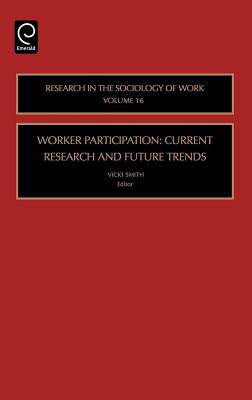
- Retrait gratuit dans votre magasin Club
- 7.000.000 titres dans notre catalogue
- Payer en toute sécurité
- Toujours un magasin près de chez vous
- Retrait gratuit dans votre magasin Club
- 7.000.000 titres dans notre catalogue
- Payer en toute sécurité
- Toujours un magasin près de chez vous
Worker Participation
Current Research and Future Trends
241,95 €
+ 483 points
Description
"Worker Participation: Current Research and Future Trends, Volume 16 of Research in the Sociology of Work", offers cutting edge research on the character and implications of workplace participation. Written by some of the leading scholars in the sociology of workplace transformation and alternative organizations, the chapters here examine various outcomes, causes, and consequences related to participation programs and worker democracy today. Topics include ways in which participation schemes are socially constructed and negotiated; the meanings that workers attach to opportunities for involvement in the workplace; practice, participation, and consent in alternative organizations such as cooperatives and collectives; and theoretical treatments that call for new ways of thinking about workplace participation. Methodologically pluralist and concerned less with specific productivity effects of worker participation, this volume highlights the social structural, social constructionist, and meta theoretical dimensions of worker participation and democratic organizations in the twenty-first century. The global, 24/7 economy and the organizational changes it has generated have enormous implications for the organization, experience and use of time in (and out of) the workplace. In addition to eroding the boundary between home and work, creating time pressures both within and outside of the workplace, the need for businesses to compete in a 24/7 global economy has re-problematized time in the workplace. Drawing on sociology, labor economics, organizational behavior and social history, the papers in this volume examine either empirically or theoretically, a variety of aspects of time in the workplace. Contributors to this volume examine issues surrounding the distribution of and struggle over work hours and how these vary across a number of factors including race, class, occupation and other structural components of work. They examine temporal structures within organizations including inequities in flexible scheduling, entrainment and work teams, polychronicity, and how changing temporal structures affect professionalism and expertise. They also consider the way in which changing uses and organization of work time, in the context of economic instability and globalization, affect the difficulties of reconciling work and family. At the more micro-level, the papers consider individuals' perceptions and constructions and intersubjective constructions of time. To varying degrees, the authors speak to the policy implications or strategies for managing new times. Taken as a whole, these papers shed light on the way in which globalization and the emergence of a 24/7 economy have altered the ways, times, and meanings of time at work. "Research in the Sociology of Work" is now available online at ScienceDirect full-text online of volumes 10 onwards. This book examines various worker participation models and evaluates the success of their outcomes. It adopts a variety of methods and highlights the different dimensions of worker participation.
Spécifications
Parties prenantes
- Editeur:
Contenu
- Nombre de pages :
- 432
- Langue:
- Anglais
- Collection :
- Tome:
- n° 16
Caractéristiques
- EAN:
- 9780762312023
- Date de parution :
- 11-04-05
- Format:
- Livre relié
- Format numérique:
- Genaaid
- Dimensions :
- 160 mm x 230 mm
- Poids :
- 734 g






